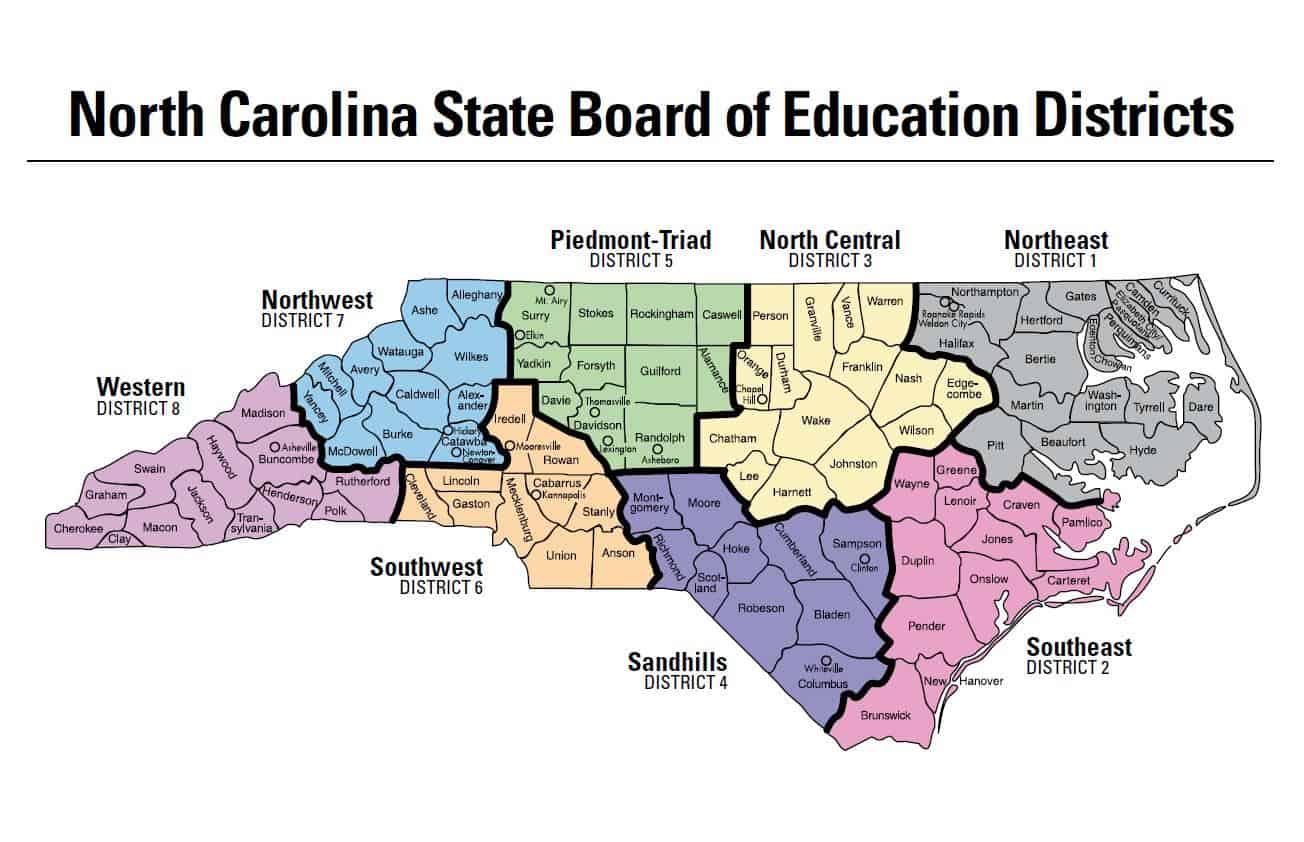Homeschooling in North Carolina continues to grow. According to the latest report issued by the North Carolina Division of Non-Public Education, the number of homeschools registered jumped from 67,804 in 2014-15 to 74,653 in 2015-16. The estimated enrollment increased from 106,853 students to 118,268. This increase is on pace with growth in recent years and shows no sign of stopping.
The last article on homeschooling analyzed all 50 states’ laws surrounding homeschooling. This research focuses on how homeschooling is dealt with at the school district level. North Carolina state law grants local school districts significant independence to determine policies around homeschooling. For example, while some states enact a state-wide policy to allow homeschool students to dual enroll in public schools, North Carolina leaves it up to the school district to determine this policy.
This research presents policies from all 115 public school districts’ Board of Education Policy Manuals regarding 1) dual enrollment of homeschool students, 2) participation in extracurricular activities, 3) grade placement of formerly homeschooled students, and 4) procedures for awarding credit for classes taken while homeschooling. While the state does not require school districts to have policies on these issues, some do. Few districts have policies for every category. The majority have no reference to homeschools in their policy manuals.
Dual enrollment of homeschooling students
For some homeschooling families, the ability to send their child to public school for one or two classes a day would be extremely helpful. As one homeschooling mom, Karen, told me, “If [my son] could go to public schools for part of the day and opt out of certain classes, I would be all over that!” However, in her school district, dual enrollment is not permitted.
Out of 115 school districts, only 13 allow dual enrollment as stated in their policy manuals. Nine of those allow or require students to take classes on campus, while the other four have online classes open to homeschool students. Another 13 districts specifically do not allow dual enrollment of homeschool students. The rest (89 districts) have no mention of dual enrollment in their policies.
| Allow Dual Enrollment | Do Not Allow Dual Enrollment | No Mention in BOE Policies |
| Alamance-Burlington, Cabarrus, Currituck, Winston-Salem/Forsyth, Henderson, Iredell-Statesville, Macon, Mount Airy, Polk, Randolph, Rutherford, Scotland, Transylvania | Ashe, Buncombe, Caswell, Chapel Hill-Carrboro, Cleveland, Hickory, Johnston, Mitchell, Rockingham, Rowan-Salisbury, Stokes, Wilson, Yancey | All other districts not listed |
Of those that allow dual enrollment, there is still considerable variation. Alamance-Burlington, Cabarrus, Iredell-Statesville, and Rutherford all allow dual enrollment in online classes. Winston-Salem/Forsyth, Polk, and Scotland only allow dual enrollment in their high schools. Randolph allows dual enrollment of homeschooled students in their middle and high schools but only in cultural arts or vocational classes. Both Henderson and Rutherford only allow dual enrollment in middle and high school.
Participation in extracurricular activities
Another important factor for homeschooled children and parents is whether or not they can participate in extracurricular activities at the public schools. While some areas with active homeschooling populations have started their own cultural classes and sports leagues, many families may still want to take advantage of extracurriculars offered by their local school district.
Nine school districts allow homeschooled students to participate in extracurricular activities. Rutherford only allows homeschooled students to participate in athletics, and Scotland only allows homeschooled students to participate at the high school level. On the other side, 15 districts prohibit participation in extracurriculars. The majority of districts (91) have no mention of it in their policy manuals, although many contain the clause that students must be in attendance 85 percent of the semester to participate in sports.
| Allow Participation in Extracurricular Activities | Do Not Allow Participation in Extracurricular Activities | No Mention in BOE Policies |
| Currituck, Henderson, Iredell-Statesville, Macon, Mount Airy, Polk, Rutherford, Scotland, Transylvania | Buncombe, Caswell, Chapel Hill-Carrboro, Cleveland, Winston-Salem/Forsyth, Franklin, Greene, Guilford, Haywood, Hickory, Johnston, Mitchell, Orange, Rockingham, Yancey | All other districts not listed |
Entering student placement and awarding credit
As homeschooling increases, so too will the amount of swirl, or movement of students in and out of public schools. If homeschooled students want to enroll in public school, the school must determine the appropriate grade placement. In high school especially, schools must evaluate courses taken in the homeschool and determine how to award credit and grades for those courses. Only a handful of school districts have specific policies for these procedures, however.
Twenty-one districts have policies for determining the appropriate grade level for formerly homeschooled students. However, two of these districts, Pitt and Vance, only have policies in their old policy manual and not in their revised manual. Twenty-three districts have policies for awarding credit for classes taken at a homeschool. Pitt, Vance, and Wake school districts only have policies for awarding credit in their old policy manuals and not the revised ones.
| Policies for Entering Student Placement | Policies for Awarding Credit | No Mention in BOE Policies |
| Buncombe, Caswell, Catawba, Charlotte-Mecklenberg, Cherokee, Currituck, Davidson, Winston-Salem/Forsyth, Franklin, Henderson, Hickory, Johnston, Macon, Mitchell, Pitt, Polk, Randolph, Richmond, Rockingham, Rowan-Salisbury, Vance | Buncombe, Caswell, Catawba, Charlotte-Mecklenberg, Cherokee, Cleveland, Davidson, Duplin, Winston-Salem/Forsyth, Franklin, Henderson, Hickory, Johnston, Macon, Mitchell, Pitt, Polk, Richmond, Rockingham, Rowan-Salisbury, Vance, Wake | All other districts not listed |
As evidenced by the small number of school districts that allow dual enrollment and participation in extracurricular activities, most districts operate on the idea that homeschooling is a separate entity from the public schools. The next article will look at two school districts that are reaching out and embracing homeschoolers.



